Pyotr Nilus
Pyotr Alexandrovich Nilus (Ukrainian: Нілус Петро Олександрович, Russian: Пётр Александрович Нилус; 20 February [O.S. 8 February] 1869 – 23 May 1943)[1][2] was a Ukrainian impressionist painter and writer who emigrated to France as the Soviet Union was formed.
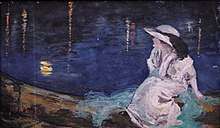
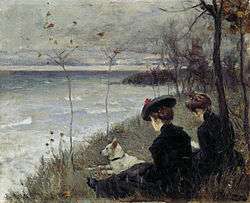
Pyotr was born to a russified Swiss family in their family estate in Podolsk guberniya in Ukraine. At the age of seven he moved to Odessa where he studied at the local Peter and Paul real school and attended art classes of Kyriak Kostandi.[1] Then he attended the Imperial Academy of Arts in Saint Petersburg and participated in exhibitions of Peredvizhniki.[3]
In 1920 he emigrated to Paris where he worked until his death in 1943. Pyotr Nilus was friend with Aleksandr Kuprin, Ivan Bunin. For the first years in Paris they lived in the same house. They led an intensive correspondence; there were published more than one hundred letters of Pyotr Nilus to Bunin[4]
Pyotr Nilus is often confused with his relative, notorious antisemite and the first publisher of The Protocols of the Elders of Zion, Sergei Nilus. In fact Pyotr was not antisemitic and in 1906 together with Korney Chukovsky actively participated in the efforts to help Jewish children, victims of the Odessa pogrom.[4]
Paintings
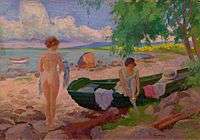 On the Beach
On the Beach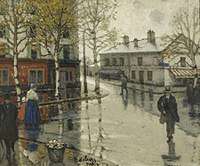 After the Rain
After the Rain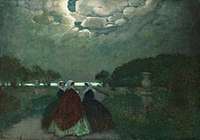 Three Women in the Park
Three Women in the Park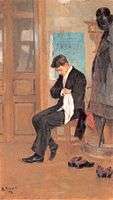 Footman (Morning)
Footman (Morning)
References and notes
| Wikimedia Commons has media related to Piotr Nilus. |
- Pyotr Nylus, the poet of art, Odessa, N3, 1996 Archived 2006-10-26 at the Wayback Machine (in Russian)
- Some sources set the death date as 1940. See discussion on
- Biography of Pyotr Nilus on rulex.ru Archived 2005-05-22 at the Wayback Machine (in Russian)
- Savva Dudakov, That Nilus and the other, Lehaim, February 2001